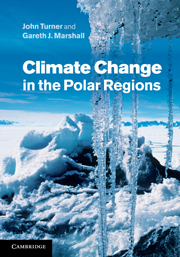Book contents
8 - Summary and future research needs
Published online by Cambridge University Press: 07 September 2011
Summary
Introduction
In earlier chapters we have given a summary of our current understanding of past climate change at high latitudes and provided scenarios of how the climates of the two polar regions may evolve over the next century under different levels of greenhouse gas emissions. We are at a critical period in the study of the Earth's climate. Improved data sets providing insight into past climate variability are constantly appearing from new ice and ocean coring initiatives. In addition, we are getting superior observations from satellite systems that give us an unprecedented coverage of the atmospheric, oceanic and cryospheric conditions at high latitudes, which allow us to better understand the mechanisms that are important there. In recent decades our ability to model the environment of the polar regions has also improved. However, there are still many questions unanswered regarding the reasons for past and current climate change and significant doubt about what may happen over the next century.
Regarding future climate changes, perhaps the largest uncertainty is over how greenhouse gas emissions will change over the coming decades. With the release of the IPCC's Fourth Assessment Report, there has been a greater willingness to accept that human activities since the start of the Industrial Revolution, and particularly over the last 100 years, have altered the climate of the Earth.
- Type
- Chapter
- Information
- Climate Change in the Polar Regions , pp. 374 - 385Publisher: Cambridge University PressPrint publication year: 2011



